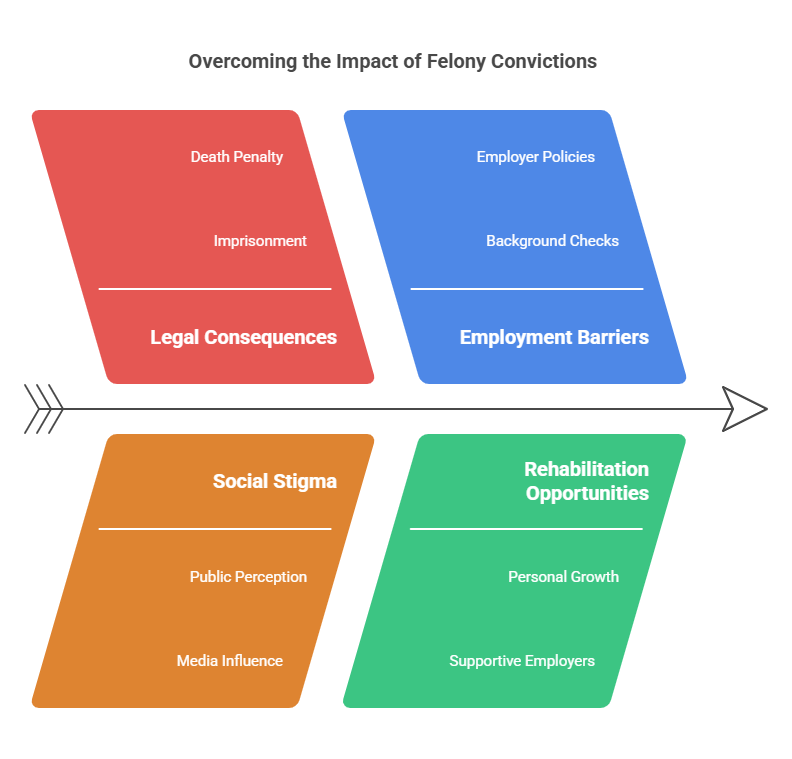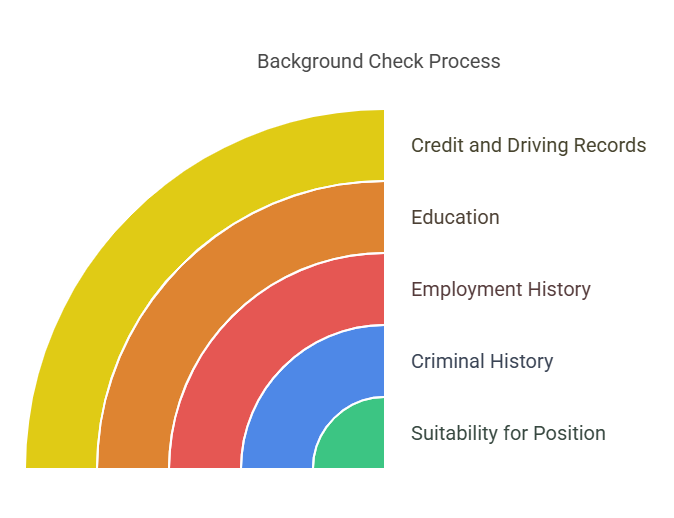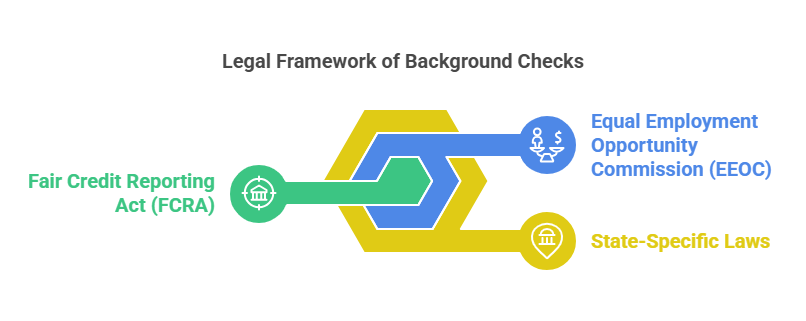Tips for Passing Background Checks with a Felony

The Importance of Background Checks in Employment and Other Areas
Background checks are a standard part of the hiring process in many industries. Employers use them to assess a candidate’s suitability for a role, ensuring that the individual aligns with company standards, values, and legal requirements. A background check is a crucial tool for evaluating a candidate’s history, including any criminal records, employment history, education, and credit history. While background checks help employers protect their businesses and maintain a safe work environment, they also play a significant role in other sectors, such as housing, security clearances, and financial services.
For job seekers, the prospect of undergoing a background check can be daunting, especially for those with a criminal record. However, it is essential to understand that while a background check may reveal a felony conviction, this does not automatically prevent someone from passing the check. In many cases, individuals with a felony on their record have successfully overcome this barrier and secured meaningful employment.
What Is a Felony, and How Can It Impact Life and Employment Opportunities?

A felony is a serious criminal offense that is typically punishable by imprisonment for over one year or by death, depending on the crime and jurisdiction. Felonies are categorized into various degrees, with more severe felonies carrying harsher penalties. Common felonies include violent crimes, such as murder and assault, as well as non-violent offenses like drug trafficking and fraud.
The impact of a felony conviction on an individual’s life is profound. Not only can it result in long-term imprisonment, but it can also affect an individual’s ability to find employment, housing, and even access to education. This is because many employers conduct background checks to assess a candidate’s criminal history, and felonies can be viewed as a significant red flag. The stigma surrounding a felony conviction often leads to challenges in securing a job, even for individuals who have paid their debt to society.
Despite these challenges, it is crucial to recognize that there are ways for individuals with felony records to overcome these barriers. In fact, many employers have policies in place that allow for exceptions in cases of rehabilitation, personal growth, and job suitability.
How Background Checks Are Typically Conducted

Background checks vary depending on the employer, the job in question, and the industry. However, most background checks involve a search of several key areas:
- Criminal History: This is the primary area of concern for individuals with felony convictions. Employers use databases to search for criminal records at the county, state, and federal levels.
- Employment History: Employers will verify previous job positions, dates of employment, and performance through references or records.
- Education: A verification of the degrees or certifications claimed by the candidate.
- Credit History: Particularly relevant for roles involving financial responsibilities, employers may check an applicant’s credit report.
- Driving Records: For jobs that require driving, employers may check an applicant’s driving history for violations or suspensions.
During this process, employers are looking for specific information that helps them gauge the candidate’s suitability for the position. When a felony conviction appears on a background check, it raises questions about the candidate’s history and whether they are trustworthy or fit for the job.
The Stigma Surrounding Felonies and Employment Opportunities
The stigma attached to felony convictions can have a significant negative impact on individuals seeking employment. Many employers are hesitant to hire candidates with criminal records due to concerns about workplace safety, reliability, and potential legal liabilities. This can lead to feelings of frustration and hopelessness among applicants, who may feel as though their past mistakes will prevent them from moving forward in life.
However, it is essential to understand that not all employers have the same stance on hiring individuals with felony convictions. Some employers are more open-minded, especially if the candidate has demonstrated personal growth, completed rehabilitation programs, or maintained a clean record for a significant period of time.
Passing a Background Check with a Felony
It is possible to pass a background check with a felony on your record. Many individuals have overcome the stigma of a felony conviction and secured employment through various strategies. The process is not always easy, but with the right approach, individuals can improve their chances of passing a background check and securing a job.
In the following sections, we will discuss how candidates with felony convictions can improve their chances of passing background checks and what steps they can take to navigate this process more effectively.
Factors That Influence the Outcome of a Background Check
There are several factors that employers take into consideration when evaluating the outcome of a background check, especially for candidates with a felony conviction. Some of the most important factors include:
1. Time Since Conviction
One of the most influential factors is the amount of time that has passed since the felony conviction. In many cases, employers are more willing to hire individuals who committed offenses many years ago, particularly if there is evidence that the person has changed and demonstrated personal growth since the conviction. Candidates who have had time to rehabilitate and prove themselves as responsible individuals may be seen in a more favorable light.
2. Nature of the Felony
The nature of the offense is another crucial consideration. Some felonies, such as drug-related offenses, may be viewed with more leniency by employers, especially if the individual has successfully completed rehabilitation or treatment programs. On the other hand, felonies involving violence, theft, or fraud may raise more significant concerns for employers, particularly in safety-sensitive or customer-facing positions.
3. Evidence of Rehabilitation
Rehabilitation plays a pivotal role in whether an individual with a felony can pass a background check. Employers are generally more willing to hire candidates who have demonstrated a commitment to turning their lives around. This may include completing rehabilitation programs, attending counseling or therapy, obtaining a GED or college degree, or holding down steady employment for a number of years since the conviction.
4. Employer Policies on Hiring Individuals with Criminal Records
Different employers have different policies regarding criminal records. Some employers, particularly those in industries that require trust and responsibility, may have strict policies against hiring individuals with felony convictions. Others, however, may be more open to hiring individuals with criminal records, particularly if the individual has made efforts to reform and rehabilitate themselves.
Importance of Honesty in the Background Check Process
Being honest and transparent during the background check process can significantly improve your chances of passing, even with a felony conviction. Many employers appreciate candidates who are upfront about their past and can provide context for the conviction. Taking responsibility for your actions and explaining what you’ve done to overcome past mistakes shows maturity and a willingness to learn from your past.
Applicants should be prepared to answer questions about their felony conviction during interviews, and should consider taking the following steps:
- Explain the circumstances: Provide a clear, honest explanation of the situation that led to the conviction.
- Highlight rehabilitation efforts: Emphasize any steps you’ve taken to rehabilitate yourself, such as attending programs or working on personal development.
- Focus on the present: Stress what you’ve done to ensure you have moved beyond your past and are now a responsible, trustworthy individual.
Being forthright about your past can often work in your favor, as it demonstrates accountability and integrity.
How Exact Background Checks Can Help
Exact Background Checks is a professional service that provides thorough and fair background checks for employers. These services ensure that background checks are conducted in compliance with relevant laws, such as the Fair Credit Reporting Act (FCRA), while also providing valuable insights to help employers make informed, unbiased decisions. For both employers and applicants, Exact Background Checks can provide guidance on navigating the background check process fairly and accurately.
Summary Table: Factors That Affect Background Check Outcomes for Felons
| Factor | Impact on Background Check Outcome |
|---|---|
| Time Since Conviction | The longer the time since the conviction, the more favorable the outcome may be. |
| Nature of the Felony | Non-violent or minor offenses may have less of an impact than violent or serious offenses. |
| Evidence of Rehabilitation | Completing rehab programs, maintaining steady employment, and demonstrating personal growth can improve outcomes. |
| Employer Policy | Some employers are more open to hiring individuals with criminal records, particularly if they show reform. |
Legal Aspects of Background Checks

Several legal frameworks govern background checks in the hiring process, and understanding these regulations is essential for both employers and applicants. Here are the key legal aspects involved:
1. The Fair Credit Reporting Act (FCRA)
The Fair Credit Reporting Act (FCRA) regulates how employers can use background checks in hiring decisions. The FCRA mandates that employers must obtain written consent from candidates before conducting background checks. Additionally, if an employer decides not to hire an applicant based on the background check, the applicant must be notified and given an opportunity to dispute any inaccuracies.
2. The Equal Employment Opportunity Commission (EEOC)
The EEOC provides guidelines to ensure that employers do not discriminate against applicants based on criminal records in a way that disproportionately impacts certain groups, such as minorities. The EEOC encourages employers to consider the nature of the offense, the time elapsed since the conviction, and the applicant’s rehabilitation efforts when making hiring decisions.
3. State-Specific Laws and Expungement
Laws regarding criminal records vary from state to state, and some states offer opportunities for expungement or record sealing. Expungement allows individuals to have certain felony convictions removed from their criminal record, potentially improving their chances of passing a background check. It is essential for applicants to research their state’s laws and consult with a legal professional if they are interested in pursuing expungement.
FAQs
What key areas are typically included in an employment background check?
Employment background checks typically include:
- Criminal History: County, state, and federal records.
- Employment History: Verification of past positions and dates.
- Education: Verification of degrees and certifications.
- Credit History: For roles involving financial responsibilities.
- Driving Records: For jobs requiring driving.
How can a felony conviction impact employment opportunities, and is it possible to pass a background check with a felony?
A felony conviction can create significant challenges due to employer concerns about safety, reliability, and liability. However, it is possible to pass a background check with a felony by:
- Demonstrating time elapsed since the conviction.
- Showing evidence of rehabilitation.
- Being honest and transparent about the past.
- Understanding employer policies.
What factors influence the outcome of a background check for someone with a felony conviction?
Factors include:
- Time since conviction.
- Nature of the felony.
- Evidence of rehabilitation.
- Employer policies on hiring individuals with criminal records.
What legal aspects govern background checks in the hiring process?
Legal aspects include:
- The Fair Credit Reporting Act (FCRA): Regulates how employers use background checks and requires consent.
- The Equal Employment Opportunity Commission (EEOC): Provides guidelines to prevent discrimination based on criminal records.
- State-Specific Laws: Varying state laws on criminal record reporting and expungement.
What steps can individuals with a felony conviction take to improve their chances of passing a background check?
Individuals can:
- Be honest and transparent about their past.
- Explain the circumstances of the conviction.
- Highlight rehabilitation efforts.
- Focus on present qualifications and responsibilities.
- Research state laws on expungement or record sealing.
What key areas are typically included in an employment background check?
Employment background checks typically include:
- Criminal History: County, state, and federal records.
- Employment History: Verification of past positions and dates.
- Education: Verification of degrees and certifications.
- Credit History: For roles involving financial responsibilities.
- Driving Records: For jobs requiring driving.
How can a felony conviction impact employment opportunities, and is it possible to pass a background check with a felony?
A felony conviction can create significant challenges due to employer concerns about safety, reliability, and liability. However, it is possible to pass a background check with a felony by:
- Demonstrating time elapsed since the conviction.
- Showing evidence of rehabilitation.
- Being honest and transparent about the past.
- Understanding employer policies.
What factors influence the outcome of a background check for someone with a felony conviction?
Factors include:
- Time since conviction.
- Nature of the felony.
- Evidence of rehabilitation.
- Employer policies on hiring individuals with criminal records.
What legal aspects govern background checks in the hiring process?
Legal aspects include:
- The Fair Credit Reporting Act (FCRA): Regulates how employers use background checks and requires consent.
- The Equal Employment Opportunity Commission (EEOC): Provides guidelines to prevent discrimination based on criminal records.
- State-Specific Laws: Varying state laws on criminal record reporting and expungement.
What steps can individuals with a felony conviction take to improve their chances of passing a background check?
Individuals can:
- Be honest and transparent about their past.
- Explain the circumstances of the conviction.
- Highlight rehabilitation efforts.
- Focus on present qualifications and responsibilities.
- Research state laws on expungement or record sealing.
Conclusion
Passing a background check with a felony is possible, and individuals with criminal records should focus on rehabilitation, personal growth, and transparency when applying for jobs. With the right approach and understanding of the legal process, candidates can successfully navigate the background check process and secure meaningful employment.
For employers and applicants alike, services like Exact Background Checks provide valuable assistance in ensuring the background check process is thorough, fair, and compliant with legal requirements. By following the appropriate steps and being honest about their past, applicants can increase their chances of passing a background check and moving forward in their careers.



